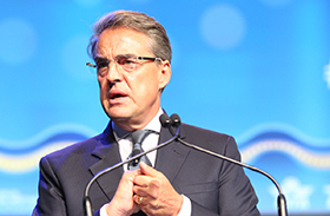
Translations:
确保航空业的未来 - 智慧监管 全球标准 基础设施 (pdf)
Asegurando el futuro de la aviación - Regulación inteligente, estándares globales, infraestructura (pdf)
Assurer l’avenir de l’aviation (pdf)
Sydney - The International Air Transport Association (IATA) called for governments to facilitate the growth of global connectivity by avoiding creeping re-regulation, maintaining the integrity of global standards, and addressing a capacity crisis.
The call came in the IATA Director General’s Report on the Air Transport Industry at the 74th IATA Annual General Meeting (AGM) and World Air Transport Summit.
“On aviation’s core mission to deliver safe, secure, accessible and sustainable connectivity, the state of our industry is strong and getting stronger. And with “normal” levels of profitability we are spreading aviation’s benefits even more widely. But there are challenges. Smarter regulation needs to counter the trend of creeping re-regulation. Global standards must be maintained by the states that agreed them. And we need to find efficient solutions to the looming capacity crisis,” said Alexandre de Juniac, IATA’s Director General and CEO.
Re-Regulation
The deregulation of the air transport industry that began in 1978 in the US ignited global changes that enabled the spread of air transport’s benefits. Competition saw the price of air connectivity fall making air transport much more accessible. In 1978 the average person flew once every 6.6 years. Today the average is closer to once in two years.
A creeping trend of re-regulation, however, puts the gains of deregulation at risk. Citing regulatory actions from around the world, de Juniac noted that regulatory over-reach now includes attempts to prescriptively regulate passenger compensation, seat assignments, the ticket options that can be offered to consumers and prices charged for various ancillary services.
“Regulations must add value. In assessing that, regulators must recognize the power of competition and social media to safeguard consumer interests. Governments should not distort market effectiveness with regulations that second-guess what consumers really want,” said de Juniac.
This is the spirit of IATA’s “smarter regulation” campaign which asks governments to align with global standards, take into account industry input and analyze the costs of regulation against the benefits. De Juniac noted that one of the most exciting current regulatory developments is the sweeping review of US commercial regulations with the aim of keeping only those where the benefits outweigh the costs to both travelers and the industry.
Global Standards
De Juniac called for a vigorous defense of global standards that have guided the safe and efficient development of aviation. “We must take governments to task. It is unacceptable that global standards are being ignored by the very governments that created them,” said de Juniac.
De Juniac noted several examples:
- India taxes international tickets in contravention of ICAO resolutions
- States are planning new environment taxes even as the ICAO-brokered Carbon Offsetting and Reduction Scheme for International Aviation (CORSIA) is about to commence as the global market-based measure for managing emissions
- Nearly two decades after the Montreal Convention 1999 was agreed it is not universally ratified. Its important modernizations apply in only 130 states
- There is not 100% compliance with Chicago Convention Annex 13 requirements for complete accident investigations. Of the approximately 1,000 accidents over the last decade only about 300 accident investigations have been concluded with published reports
- Annex 17 of the Chicago Convention sets baseline security requirements. Yet ICAO audits reveal that only 28% of states meet them. Moreover, 37% of states fail on resolutions of security concerns


